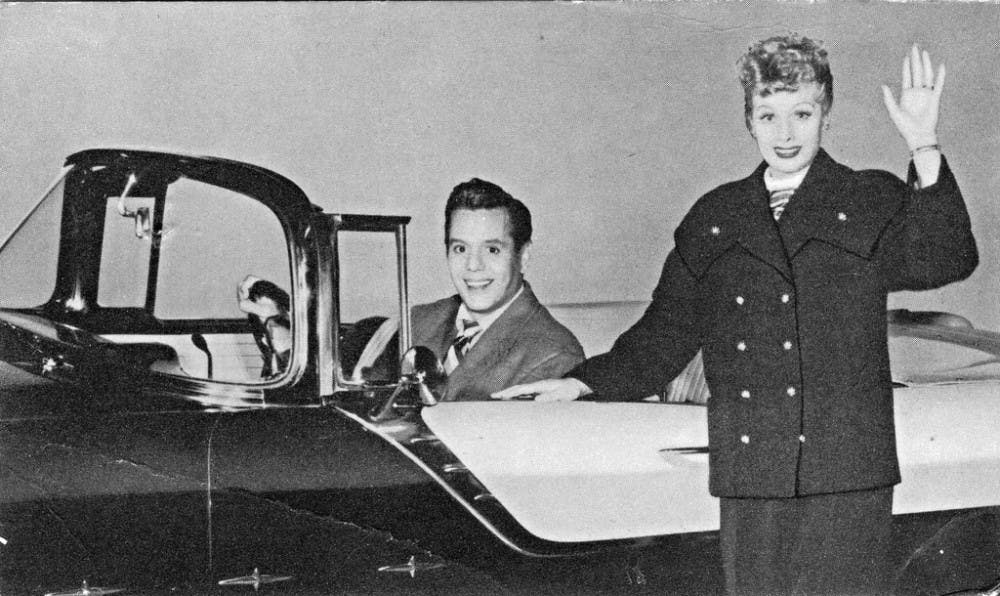2018 started off with a bang, with female-led programming on the rise, with newcomers like The Marvelous Mrs. Maisel, actresses spotlighting abuse through political activism; wage and class lines seem to be shifting in the necessary direction outside of burden and into necessary obligation. But the women professing #TimesUp haven't always been alone in their demands for equality. Here’s a look back on eight extraordinary women who used their loud voices and platforms to start the conversation.
Lucille Ball as Lucy Ricardo, I Love Lucy
Lucille Ball has been a household name for over seventy years, but it was her 1950s sitcom I Love Lucy that first took the world by storm. Not only did Lucy and her then husband, Desi Arnaz launch their own production company to produce I Love Lucy in-house, but theirs was one of the first interracial couples on primetime. Executives at CBS voiced their doubts, but they simply couldn’t lose Lucille and the move to go on with the show changed television forever after.
Miyoshi Umeki as Mrs. Livingston, The Courtship of Eddie's Father
Miyoshi Umeki’s is a story that begs for the telling. Following WWII she traveled with a U.S. Army jazz band in Japan as Nancy Umeki, eventually moving to the US in 1955 and staring in her most famous television role as the much beloved Mrs. Livingston on The Courtship of Eddie’s Father. While most of her film and television roles fell squarely into the Japanese female stereotypes of delicate humility and subservience, Umeki made history as the first Asian performer to receive an acting Oscar for her role in the iconic post-WWII film Sayonara in 1957.
Lynda Carter as Diana Prince, Wonder Woman
Wonder Woman and the creative women who carry its banner have upheld the comic’s women-centered directive with the vigor of superheroes themselves. With Patty Jenkins and Gal Gadot’s extraordinary performances in acting and directing, and Gadot refusing to star in a sequel to the blockbuster film should producer Brett Ratner, accused of sexual assault return to the franchise the feminist favorite has more than earned its stripes. Forty years earlier, however an America reckoning with second and third-wave feminism was waited with bated breath for the superhero’s television debut, and it came in the form of Lynda Carter. Her live-action rendition of the Amazonian goddess fought bad guys on and off-screen, including in the boy’s club that was the entertainment industry of the 70s. It feels good to see the tradition live on.
Fran Drescher as Fran Fine, The Nanny
Fashionable funny girl Fran Fine is unforgettable for several reasons, and each is her own doing. The Jewish-American queen of Flushing, Queens came up with the idea for The Nanny while visiting a friend in England and with it created a show of what feels like the freshest take on the time-honored, comedic vestiges of Lucille Ball. The Nanny’s success seemed to come overnight, launching both the show and Fran to her well-earned feminist pedestal in television history.
Queen Latifah as Khadijah James, Living Single
In a ‘90s kind of world’ or not, Khadijah, the twenty-something editor-in-chief of fictional Flavor magazine reminded us how good it was to have our girls. In a Brooklyn brownstone, Khadijah and three other twenty-somethings, black women laughed, loved and struggled through the job, relationships and family troubles we have come to expect from the modern sitcom, except Living Single was smarter, funnier and unapologetically Black. The series would go on to inspire Lorne Michaels for another New York-centered spin-off by the name of Friends and laid the commercially successful foundations for Issa Rae’s Insecure.
Lucy Lawless as Xena, Xena: Warrior Princess
As bad-assery and everything we are taught a woman shouldn’t be personified, we owe Xena our whole hearts. The bisexual, warrior brought to life by the actress aptly named Lucy Lawless provided a pre- Game of Thrones world with a universe of women with the fate-making power reserved for male figures like those of Hercules: The Legendary, where she first appeared. Xena’s success set the stage for the likes of Game of Throne’s Cersei Lannister, Daenerys Targaryen, and warrior Brienne of Tarth—and, if only for them, we are forever indebted.
Yara Shahidi as Zoe Johnson, Grown–ish
Grown-ish is a sitcom that grew from the heart of college-centered shows like A Different World, and with the monumental appeal of Buffy, despite it’s much lighter tones. Along with a young, diverse, ensemble crew, Zoe must navigate college life through the unprecedented years of the twenty-teens. Though the show is still finding it’s season one legs, in presenting a nuanced view of college life for diverse, young viewers it’s got plenty of room to find its wings.







